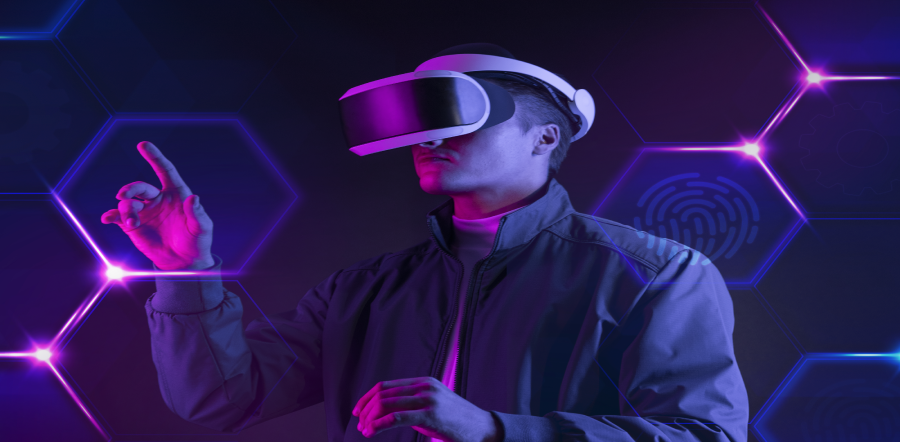Mark Zuckerberg announced that the name of the firm's parent company (which was formerly known as Facebook) will be changed to Meta, bringing the company closer to the metaverse goal that the brand has been working towards in the hopes of altering the internet experience for everybody.
This move isn't entirely surprising considering that the company announced just a few weeks ago that it would hire 10,000 highly skilled workers in Europe to assist in the development of its "metaverse," and that the company has also faced backlash following the revelations made by whistleblower Frances Haugen.
The question is, what exactly does the term "metaverse" entail, and will it actually assist to make our online experience safer and more private?
See also: Top Tech Trends That Are Set To Rule 2022
What Exactly Is The 'Metaverse'?
"Meta," the prefix of the phrase, is derived from the Greek language and means "beyond, beyond, or beyond." As a result, the word "metaverse" might be defined as a location that exists outside of the world or the universe as we know it, a place that lives in the virtual realm yet seems to be as real as the actual world.
Avatars were first used in a science fiction book authored by Neal Stephenson called Snow Crash in 1992. The word "valorization" was used to allude to the confluence of physical, augmented, and virtual reality in which individuals communicate with one another using their avatars. This whole concept, together with the development of new infrastructure and the creation of real-time 3D environments, is being heralded as the next phase in the growth of the internet.
It is possible to divide the metaverse into two halves.
One of them is concerned with the creation of a blockchain-based metaverse via the use of NFTs and cryptocurrencies. Some examples are Decentraland and The Sandbox, which enable anyone to buy virtual tracts of land and create their own surroundings, respectively.
The other, on the other hand, is a straightforward virtual environment where individuals may meet and welcome one another. According to Facebook, this version of the metaverse is being developed.
Is This A Brand-New Phenomenon?
No, not really, at least not for those who like playing video games. Anyone who has seen The Matrix or is familiar with Fortnite and Ready Player One will have an easier time comprehending the procedure and the functioning on which this notion will be founded than those who haven't. What Facebook is developing is very similar to what these gaming goods provide; it will be comparable to placing the user within a virtual environment where meetings might be placed utilizing virtual reality (VR) headsets in a selected avatar and backdrop setting, similar to what these gaming products provide.
Horizon Home, a 'more sociable' house area for Oculus users that appears like a virtual home, was just introduced by Facebook, and consumers can now invite their friends to join and hang out or play video games.
However, the virtual world that Facebook envisions will not be limited to gaming alone; rather, it will be more comprehensive and broad in terms of offering amenities ranging from office to leisure, among other things. Essentially, the objective is to create an online environment in which individuals may interact, work, and communicate without having to physically be in the same place.
Investment in the Facebook Metaverse
In the recent past, it has been noted that Facebook has made the creation of the metaverse one of its top priorities, according to certain reports. And it has done it by aggressively investing in virtual reality via the use of its Oculus headsets. Analysts think that the tech giant has even suffered a loss in the process of growing the product's sales by maintaining its pricing lower than the competitor's price, according to their calculations.
With the debut of Facebook Horizon in 2019, Facebook has taken things a step further by creating a virtual reality environment. However, for the time being, it is an invitation-only immersive world that people may access by donning an Oculus Rift headset. More recently, in August of this year, the business launched Horizon Workrooms, a feature that allows co-workers who are wearing virtual reality headsets to attend meetings in a virtual room where they all appear as cartoonish 3D representations of themselves.
What Will Happen To The Protection Of Personal Data?
The timing of the employment announcement has come under scrutiny and has been called into doubt by industry experts. However, despite the fact that the company has not shared many details about data privacy and how data will be used and protected in the metaverse, serious concerns about Facebook's handling of user data in the past continue to cast a shadow over the entire project, which ultimately leads to the qualitatively different approaches the company would be required to take this time.
However, for the time being, the entire concept of the metaverse is centered in Europe, where the European Union has put in place some of the world's strictest data privacy and processing rules as part of the General Data Protection Regulation (GDPR), which is seen as part of a strategy to stay on the right side of regulators while developing new technology.
Conclusion
When the pandemic started in 2020, we had already redefined the term "virtual." Zoom, online games, Clubhouse, Twitter Spaces, and every other social app on our phones exemplify our perception of the virtual.
As a result, 'Metaverse' is a catch-all phrase. It is a virtual environment in which one may travel fluidly between various sorts of digital worlds and devices while maintaining the same virtual identity. Subscribe to whitepapers.online to learn more about the new technologies impacting the iT sector.
Featured image: Technology photo created by rawpixel.com - www.freepik.com

